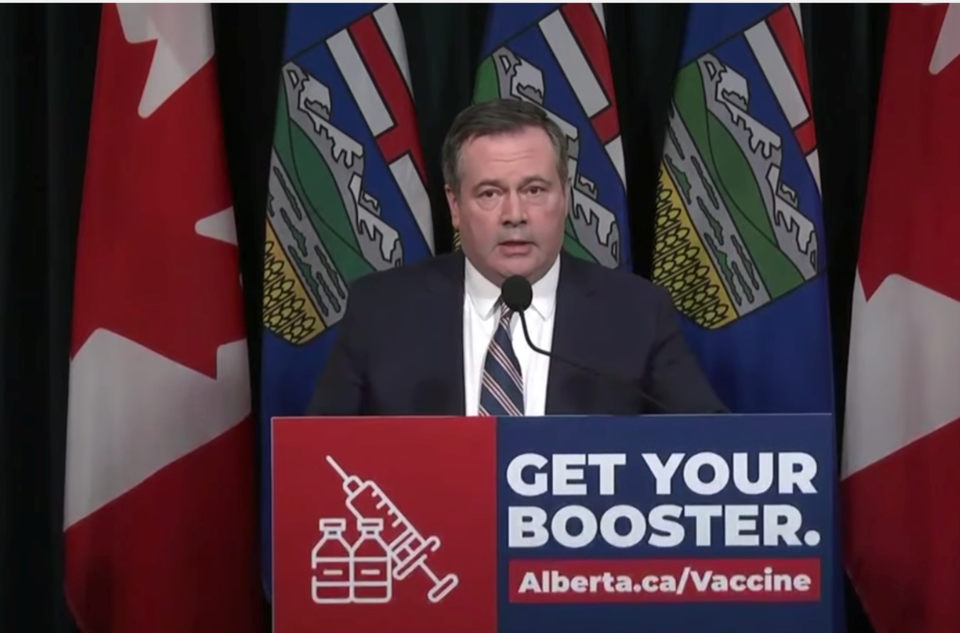Premier Jason Kenney gave an update on the developing situation at the Coutts border crossing Tuesday, saying RCMP had begun to take action against an "unlawful blockade."
“[RCMP] have done what they can over the past four days to seek an agreed-upon approach that would see an end to the roadblock. Unfortunately, the approximately 100 remaining individuals participating in that process have apparently refused to negotiate in good faith with the RCMP,” said Kenney.
Kenney said he was briefed on the situation earlier Tuesday by deputy commissioner Curtis Zablocki, along with acting Justice Minister Sonya Savage and Transportation Minister Rajan Sawhney.
“We were briefed that on Saturday, approximately 10,000 trucks and other vehicles began a moving convoy around the Coutts Border Station,” he said.
Police monitored the situation at that time, as they believed it was a lawful protest.
“What may have begun as a peaceful assembly quickly turned into an unlawful blockade,” Kenney read from a statement issued Tuesday by the Alberta RCMP.
The RCMP had engaged with protesters to find a peaceful and safe resolution, Kenney read from the RCMP statement.
“The protesters eventually chose not to comply,” Kenney read.
Further action, as of Tuesday morning, was taken by RCMP as the blockade continued to impede the ability for emergency agencies to provide full services to area residents, along with impacting the flow of goods and services, said Kenney.
“As per the Critical Infrastructure Defence Act of Alberta, anyone who actively blocks a highway, or aids, councils, or directs a highway to be blocked, may be subject to arrest and charged under the act,” said Kenney.
Kenney said a serious situation is unfolding at the border and it is unfortunate to see a small number of people breaking the law and embracing hateful symbols.
Kenney said he had also received reports of people allied with protesters assaulting RCMP officers, “including one instance [of] trying to ram members of the RCMP, later leading to a collision with a civilian vehicle in the area. This kind of conduct is totally unacceptable,” he said.
Kenney said about 30 truckers got caught in the blockade and were without food or access to medicine for “the better part of three days.”
“Thankfully, they were finally released from the blockade,” said Kenney.
Earlier in the press conference, Kenney had read from a statement he issued last week, saying Albertans have a democratic right to engage in lawful protests.
“I urged those involved in the truck convoy protests to do so as safely as possible, not to create road hazards that could lead to accidents or unsafe conditions for other drivers,” he said.
“Your participants in this convoy cross the line and break the law, I expect the police to take appropriate action,” he read.
Kenney had asked organizers to dissociate themselves from anyone involved in bigotry and hate and said Albertans should unite in condemning these actions.
He then thanked Albertans and truckers who have received vaccinations. He also thanked truckers who have kept the economy going.
“Finally, I said, I repeat our call on the Canadian and U.S. governments to exercise common sense by restoring the exemption for quarantine requirements for unvaccinated truckers,” he read.
After reading from the statement, Kenney said there is no doubt many well-intentioned Canadians have participated in the protests over the past week, “frustrated by public-health measures that have been designed to prevent a catastrophe in our health-care system.”
He said many have been focused on the vaccination requirement for cross-border truckers between Canada and the United States.
For the lawful protesters, Kenney said he understands the concerns and frustrations they may have.
“For those opposed to the quarantine requirement for cross-border truckers, not only do I hear you, but I agree with you,” he said.
Kenney said he went to Washington, D.C., to find allies from both the Canadian and U.S. governments.
The premier also said if the blockade continues, it will impact the province's economy, in terms of both imports and exports.
“We estimate that some $6 billion of exports pass from Alberta to the United States primarily through the Coutts border crossing every day.”
Kenney said each day the crossing is closed represents a cost particularly to agricultural producers, to livestock producers, farmers, and food producers in Alberta.
Kenney reminded Albertans there are three other points of entry between Alberta and Montana — one on Highway 2, one at Highway 89, and one at Highway 41.
Finally, Kenney said if anyone is upset about government policy, that is fine.
“That's your democratic right. But please express it in a peaceful and law-abiding way. And please do not add further difficulty to an already very tense situation there at the border.”



